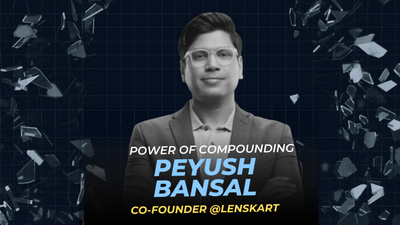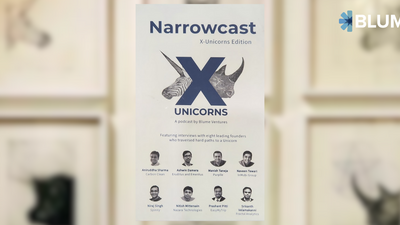“India is not a big market. It's a small market with a big potential and your business plans need to provide for it.” - Manish Sabharwal
A great way to understand the mind of Manish Sabharwal is to peep into his Goodreads account. In it, you can amuse yourself with vivid books, ranging from Deng Xiaoping and the Transformation of China, Principles by Ray Dalio, or even a book called The Indian Constitution: Cornerstone of a Nation.
The co-founder and Vice Chairman of TeamLease, one of the country’s biggest employment companies, is also a tenacious reader and a frequent columnist with the Indian Express, where he expresses his thoughts on policy, education, and employment.
He is also a member of the Central Advisory Board of Education and a governing board member of the National Council of Applied Economic Research. Along with this, he has also served as an Independent Director on the Board of the Reserve Bank of India and is also a Managing Trustee of the New India Foundation, which offers fellowships to write books about post-1947 India.
He doesn’t just have a perspective on the India Story, but in many significant ways, he’s building the India Story with his own mind and hands.
But none of this would have been possible without his belief in the country and its people.
Wharton MBA to Labour Contractor
Growing up, Manish Sabharwal was heavily influenced by his parent’s ‘civil servant attitude,’ where being rich, thin, and good-looking wasn’t the primary objective of life.
There was so much more to living.
But he ended up at one of India’s most prestigious undergraduate colleges anyway.
After completing his stint at Shri Ram College of Commerce and while studying business at Wharton, one of his favorite courses was by the famed former Governor of the Central Bank of Turkey, Bultent Gultekin, who, along with finance and numbers, also spoke about the wise society and stupid entrepreneurs. Something that Manish remembers fondly was:
Manish: “Entrepreneurs need to be delusional. 10 of them. Society needs all 10 to believe the delusion, but society only needs one to succeed. But since it doesn't know which one, it will encourage all 10 to be hormonally imbalanced.”
The entrepreneurship bug caught him shortly after his MBA, and he came back to India to start IndiaLife with his co-founder Ashok Reddy, a company in the pension space.
A few years later, his company was acquired by the NYSE-listed Hewitt Associates. Shortly after that, he shifted to Singapore, disliked the move, and came back to India because he had no fun being the big fish in the small pond.
Manish’s aspirations were bigger, bolder, and more ambitious.
He wanted to meld the worlds of people, productivity, and profits.
In a country that was hungry (and slightly desperate) to drive its young population to the workforce.
IndiaLife to TeamLease
Manish: “We wanted our next company to be three things: fun, profitable, and good for India.”
While many suspected that Manish came up with this mantra in retrospect that’s not really the case. His past experiences drove him to think of these three things. Being a part of the steel business was profitable and good for India but not fun. The cola business is fun and profitable but not good for India.
Manish: “At least my dentist doesn't think so.”
While at TeamLease, with a paid-up capital of 18 crores, Manish and Co. have hired somebody every 5 minutes for the last 20 years.
This happened with a razor-sharp focus on the Indian market and finding ‘kids for jobs,’ and not the other way round. His insight was simple: The business didn’t have high margins, and the evolution had to be made from the employment business to the employability business.
Good employers in India were scarce. And servicing them and their employability needs was TeamLeases’ priority.
Manish: “When we started, my wife asked me, you went to Wharton to be a labor contractor?”
Your Motto is your Unfair Advantage
If you head to TeamLease’s website and look to the upper left corner, the slogan proudly proclaims, “Putting India to work.”
There was quite a bit of thought behind this, which served not just as a motto but also as their vision from Day 0. But Manish realizes that this isn’t something that they could attain in their lifetime, at least putting the whole of the nation of 1 billion people to work.
But he looked at it as an opportunity rather than a concern.
Manish: “It really becomes an unfair advantage because you're perpetually one step behind what you need to be doing and what you want to be doing.”
While it may seem like an unfulfilled prophecy, Manish and his team have a positive spin to it.
As TeamLease enters its 25th year, he has spent the past few years trying to institutionalize the company so that even if he can’t attain the motto in his lifetime, his successors will still have a North Star to chase.
Amanat vs. Jagir: The Next Quarter vs. The Quarter Century
Manish: “You can't have balance if you only think about the next quarter; nobody's going to give you benefit for the next quarter century.
If you only talk about the next quarter century though, you won't be around in a few quarters. So I think this balance of giving people a sense of an addressable market but sustained growth, that's the biggest signal of success.”
Although it makes intuitive sense, achieving this ‘balance’ between the next quarter and the quarter century is extremely hard. Having grown up in Kashmir, Manish explains the mental model to balance the long-term with the short-term with two important terms, amanat and jagir.
While jagir is something that you can enjoy during your lifetime, amanat is something you build for future generations.
But this isn’t just restricted to assets but also the way you operate your business. The time period for which you are building your business determines the quality of your business. The way you fund your company. Or even the kind of people you hire.
Compounding isn’t just something that happens to you. It’s a conscious journey you set yourself up for.
The dessert, the amanat, at the end of the meal, is sweet and satisfactory, but seldom do we have people waiting for it.
Lack of patience affects all businesses and people. Those who enjoy the dessert at the start of the meal get short-term dopamine, but they rarely end up building big.
Manish: “HDFC, Infosys, or TCS, all the companies that have taken decades to do what they have done. The compounding, the real value has really come in the last decade, even though they've been around for 20-30 years.”
But the dessert called compounding isn’t one without a recipe.
The Ingredients for Compounding
Reflecting on his journey, Manish mentions how some ingredients are a must for compounding to take place:
- Sustained growth across quarters. Thinking about the long-term while delivering in the short-term. You have to strike the balance. Over-indexing on either can be a death knell.
- The right cap table: How much you have on your cap table and from whom is almost as important as who you have as your employees. If you need ‘perpetual capital,’ you need to structure your cap table and have people who believe in the long-term.
- Cognitive Diversity: Not building a mono-culture of people. Having similar people can be detrimental to your business. Manish gives his own example, where he remarked how a board member quipped that the very reason the company still exists today is because of how different he and his co-founder are as people.
Manish: “It has already happened in public markets, right? If you see what happened in FMCG - Britannia, Pidilite, Marico, Dabur, all the families have hired multinational alumni and seen their market cap go up 20 times. I mean, Varun joined Britannia when it was 8,000 crores, now it is one lakh crores. Duggal joined Dabur at 10,000 crores, it was 1 lakh crore when he left.”
- Protecting you from your own self - Greed is a funny thing. Manish mentions how entrepreneurs can often be their own enemies. To ensure that there is a healthy counterweight, it’s important for your company to have checks and balances. Should you ever go reckless with funding, spending, or even ambition, have somebody who has the power to veto your ideas or at least question them.
But even if a company has these ingredients, compounding is not the easiest dish to cook in the kitchen.
Companies Are Always WIP
It’s quite romantic to think of your company as something that grows in tandem with your business.
Manish’s experience has been quite the opposite, where he has found the business and the company to often be at odds with each other.
Manish: “My sense is every time you double your revenues, you choke on your growth. The structures don't work. The list of ingredients is obvious, but the recipe is not working. The list of ingredients looks the same, but the recipe is now different.”
As the popular saying goes in venture: What got you here won’t get you there.
Manish: “Going from zero to second floor doesn't take you from second floor to fifth floor. And that's when we had to change our org structures. Structures are very powerful things. You don't think about structure and people talk about culture eating strategy for breakfast. My sense is that structures eat strategy for breakfast.”
To Manish, the company is like a compulsive phoenix, always building itself from its own ashes. Therefore, company building is an art where structures are constantly shape-shifting, depending on the current growth trajectory of the organization.
Manish: “And so my sense is every time you double your revenues, it's nice to digest your growth a little bit. Does that mean you have to slow down?”
Manish: “When we finished five years, I took a month off and said, Look, we're moving from small cap to mid-cap. The 350th company in India is worth 5000 crores, the 100th company is worth 40,000 crores. That's the range now. So I said, now we have to be at 40,000 crores. That's our target. So let me go and meet investors and say, “What are the characteristics of the people that you went to?”
But no amount of structural nuance can get you past people.
Manish: “You campaign in poetry, but you govern in prose.”
Who Is Your Role Model?
Knowing the importance of not just stories but the people who tell these stories is an art form in itself.
In a vivid example from Kanpur, where his parents live, Manish shares how some people feel it is okay to be corrupt as they consider Ponty Chada or Subrato Roy as their role models.
Closer to his home in Bengaluru, stalwarts like Narayan Murthy and Kiran Mazumdar Shaw have always spoken about building great companies and creating generational luck, by expanding your surface area of luck and thinking about the right kind of problems.
In fact, these role models have played an instrumental role in making Bengaluru such a conducive space for young companies and startups to set up shop.
It’s not just the nice weather but creating the right kind of jobs for the right kind of people that makes long-term employment easier.
The Education-Employability-Employment Trifecta
Fascinatingly, Manish opines that employability is not so much of a problem of education but rather a lack of skills-based training and development.
Manish and his team at TeamLease are approaching the employability problem in a unique way.
Manish: “An apprenticeship is a bipartite contract between an employer and a kid. What we need is a tripartite contract between university, kid, and employer. Which is what degree apprenticeships finally do. So it's still early days, but I think the world of education, employment, and employability is converging.”
Why is this happening now? Because careers are longer, more complex, and more multi-dimensional than ever. Rather than just a ‘learn it and forget it’ approach, Manish strongly believes that classrooms will behave like ‘ramps’; each time you feel like you’re getting left behind, you take off on the ramp and apply your learnings to your occupation.
While the current scheme of things is lopsided, with too much effort required on the employer’s side to make the candidates ‘job ready,’ the tripartite approach eases out the pressure by training the students to be employable right from when they start in college.
Manish: “College isn't what it used to be, but social signaling still matters. So I think degree apprenticeships are our bet for the next 10 years.”
The Belief in India’s Compounding: The Keys of Productivity
Even before his bet on degree apprenticeships, though, Manish has been quite bullish on the India story.
Manish: “I think we made some crappy economic choices in ‘47. But 1991, we started fixing those choices. And in the last 10 years, I think we finally accepted that poverty is about productivity.”
His thesis is simple: We’ve never had a shortage of labor, land, or capital. What’s really been the issue is that our labor potential hasn’t been harnessed due to poor education.
But things are looking up.
Manish: “India exported more software than Saudi Arabia exported oil in 2021.”
While this fact might not mean much at face value, it’s indicative of the sheer trust that institutions, global and domestic, are placing in the India story and the businesses that are investing in scaling India’s human potential.
Parallelly, though, poverty still remains one of the biggest issues plaguing the country.
Manish: “There is no such thing as poor people. They are only people in poor places. An electrician moves from Bihar to Bangalore, gets four times more salary, moves to Switzerland, gets 25. But we always view places as physical places, but it's also which sector, which company, and which skill you are at. In the 21st century, you have to not just define places as cities, states and countries, but we also have to define which sector, which company, and which skill you have, and then you'll get the wage premium.”
Manish’s unflinching belief in India is not without its caveats.
The fact that we have a huge population is our demographic advantage, but only if this cohort harnesses the skills that are required for them to get jobs. There is immense potential, with the whole conversation around AI barely posing a threat to us since 40% of our workforce is sadly close to zero productivity anyway.
In Defense of Strategy
Lately, it has become quite fashionable to pontificate on the usefulness of strategy.
Manish: “Strategy is the art of reconciling unlimited aspirations with limited resources. It’s the most upstream skill. It’s something some people are born with, but like most skills, I think it can be learned.”
What Manish Sabharwal thinks about strategy is similar to what he thinks about compounding and the India Story in general.
We, as a country, are boundless with our aspirations but are burdened with limited resources.
But if the right minds are being channeled into the right places with the right kind of skills and jobs, that’s good news for everybody. Especially in a country like ours, which has the 5th highest total GDP but still lags behind at the 139th spot on per capita terms.
But so long as we have visionary entrepreneurs like Manish Sabharwal leading the charge at companies like TeamLease, the journey from potential to productivity becomes that much easier.
This was an edited excerpt from the fifth episode of the second season of Blume’s Podcast. You can listen to the full episode here.
Spotify
Youtube







